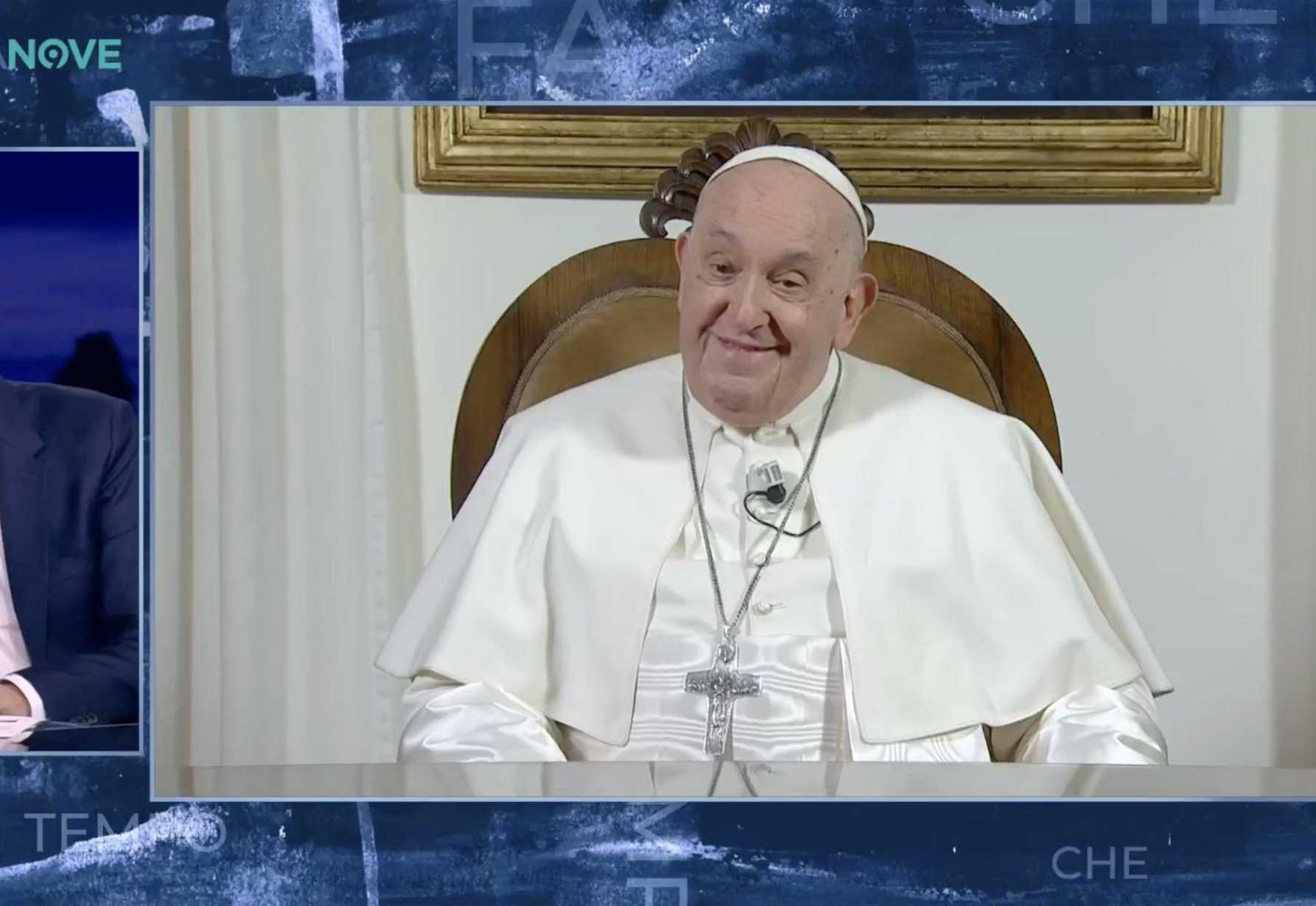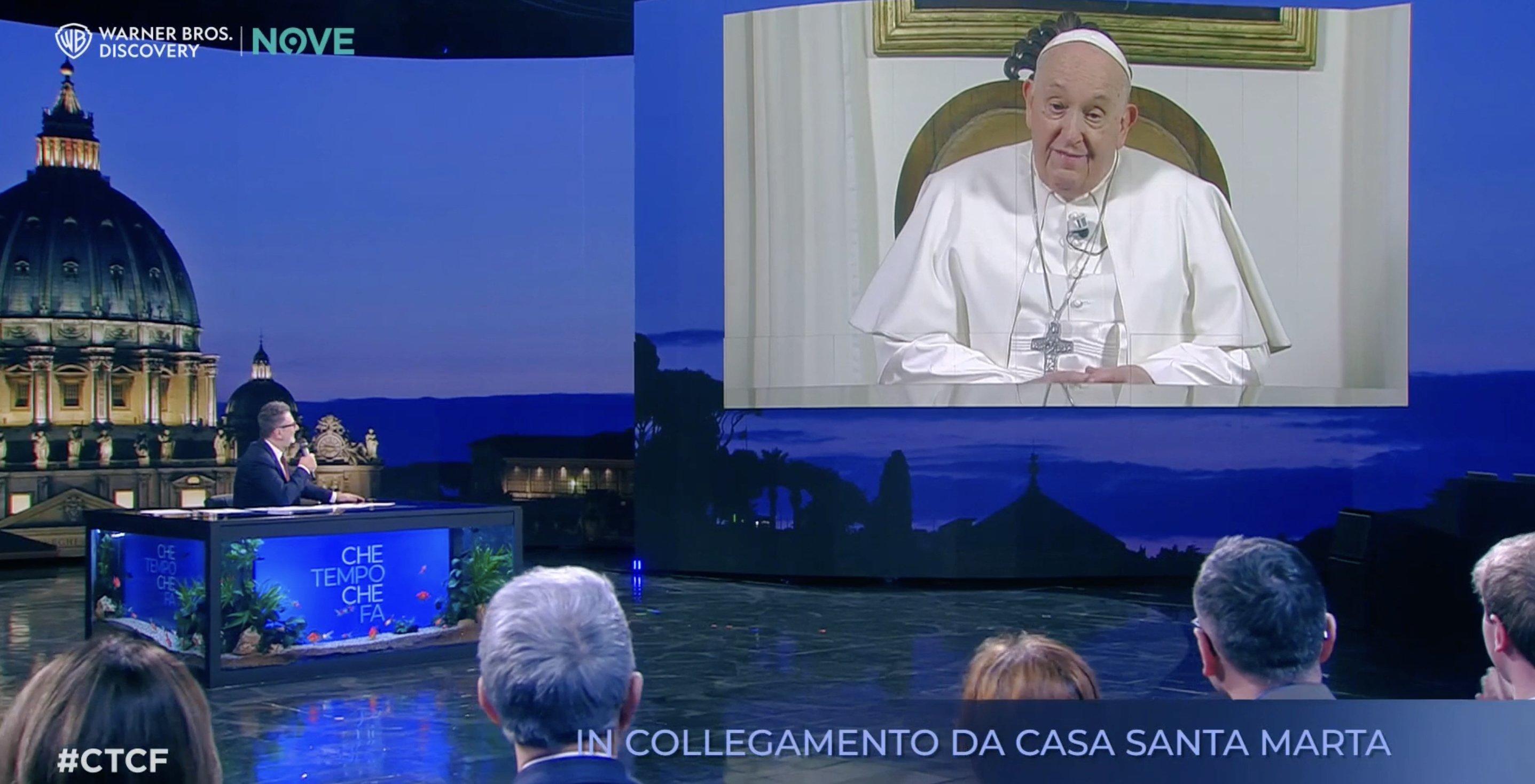Pope says he's not thinking of resigning, talks about blessings
In a 50-minute interview on Italian television Sunday night, Pope Francis spoke about his office, God's love, hell, war and the recent document about blessings.
 Cindy Wooden
Cindy Wooden

Pope Francis listens to a question from Fabio Fazio in this screen grab of an interview on "Che Tempo Che Fa," a television program on Italy's Nove channel. (CNS photo/Courtesy of Che Tempo Che Fa)
VATICAN CITY (CNS) -- While a pope can resign, Pope Francis said it is not something he is thinking about or worrying about now.
"It is neither a thought, nor a worry, nor even a desire; it is a possibility, open to all popes. But for the moment it is not at the center of my thoughts, my worries, my feelings," he said in an interview on Italian television Jan. 14.
"As long as I feel I still have the capacity to serve, I will go on," the 87-year-old pope said. "When I can no longer do it, it will be time to think about it."
Pope Francis made the comments in an interview, lasting more than 50 minutes, on the program "Che Tempo Che Fa" on Italy's Nove channel.
He also said that "in August I have to make a trip to Polynesia" and that sometime after that, he hopes to go to Argentina for the first time since his election in 2013.
Pope Francis was asked how he imagines hell if he really believes God forgives everyone who asks.
"It's difficult to imagine it," the pope said. "What I would say is not a dogma of faith, but my personal thought: I like to think hell is empty; I hope it is."
Fabio Fazio, the program's host, asked the pope if he ever feels alone, especially when there is negative reaction to his decisions, for example, his approval of the Dicastery for the Doctrine of the Faith's declaration that a priest can offer informal blessings to gay couples as long as it is clear the church is not equating their union to marriage.
"Yes, as you say, when you make a decision, there is a price of loneliness that you have to pay, and sometimes decisions are not accepted, but most of the time, when decisions are not accepted, it is because they are not understood," the pope responded.
Sometimes, rather than trying to understand and to have a direct, "fraternal discussion" about a decision, he said, people just hang on to their doubts and become "a resistance and make ugly conclusions."
"This has happened with the recent decision about blessing everyone," Pope Francis said.
But, he insisted, "the Lord blesses everyone, everyone. The Lord blesses everyone who is capable of being baptized, that is, every person. But then people must enter into conversation with the Lord's blessing and see what path the Lord is proposing for them."

The pastoral work of the church, he said, is to "take them by the hand and help them to go down that road, not condemn them from the start."
"I always tell confessors: Forgive everything and treat people as kindly as the Lord treats us. And then if you want to help people, you can talk and help them move on, but forgive everyone," he said.
Pope Francis repeated his conviction that God never tires of forgiving people, but people tire of asking God's forgiveness.
"The Lord waits for us, he knocks at the door of many hardened hearts so that they will have the ability to recognize the wrong they are doing," he said.
Fazio asked the pope about the phrase in the classic Act of Contrition: "I detest all my sins because of thy just punishments."
"Sin deserves punishment," the pope said. But he said he believes the "literary expression" in the classic version of the prayer "is too harsh given God's love. I prefer to say, 'Because by sinning I have saddened your heart.'"
"In my 54 years of priesthood -- I've been a priest 54 years; I'm old," he said. "This is a confession. In these 54 years, I've only denied forgiveness once because of the person's hypocrisy. Just once. I've always forgiven everything even when I knew the person could fall again, but the Lord forgives us. He helps us not to fall or to fall less, but he always forgives."
Asked what worries him, Pope Francis responded that "some things do scare me. Some things frighten me. For example, this escalation of war frightens me."
With nuclear weapons stockpiled, he said, one wonders "how will we end up, like Noah's ark? That scares me, the capacity for self-destruction that humanity has today."
Fazio also asked the pope why he always asks people to pray for him.
"Because I'm a sinner and I need God's help to remain faithful to the vocation he has given me," the pope responded.
"The Lord called me to be a priest, a bishop," he said. "As a bishop I have a great responsibility in the church. I recognize my weaknesses, which is why I must ask for prayers, that everyone pray that I remain faithful in serving the Lord, that I don't end up with the attitude of a mediocre shepherd who does not take care of his flock."



